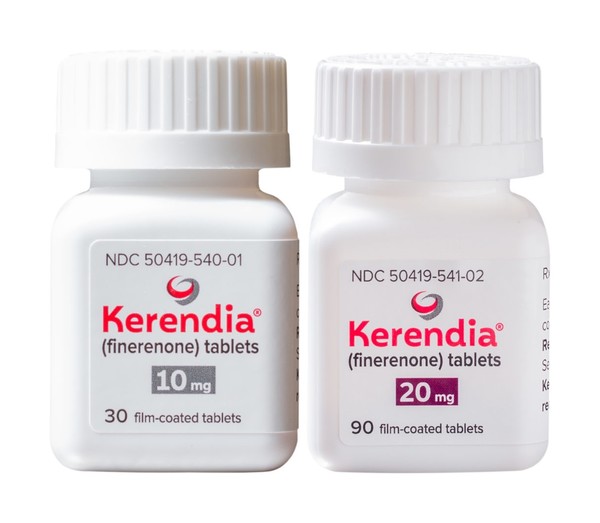A new drug, which proved heart and kidney protection effects in chronic kidney disease (CKD) patients accompanying type-2 diabetes, has arrived in Korea to counter well-established SGLT-2 inhibitors.
On Tuesday, the Ministry of Food and Drug Safety authorized the use of Bayer’s Kerendia (ingredient: finerenone) to treat adult CKD patients with type-2 diabetes.

Specifically, the new treatment prevents sustained eGFR (estimated glomerular filtration rate) reduction and progression to end-stage CKD and lowers the risk of cardiovascular death, non-fatal myocardial infarction, and hospitalization for heart failure (HF).
Up to 40 percent of type-2 diabetic patients accompany CKD. Despite guideline-directed therapies, patients with CKD and type-2 diabetes are at high risk of CKD progression and cardiovascular events.
Kerendia is a non-steroidal mineralocorticoid receptor antagonist (MRA) that inhibits the overactivation of mineralocorticoid receptors that cause fibrosis and inflammation. By doing so, the treatment can prevent permanent structural damage to the kidneys.
The approval was based on data from the phase 3 FIDELIO-DKD study where Kerendia improved renal failure, sustained decline in renal function, and time to kidney-related death.
The FIDELIO-DKD trial investigated Kerendia’s efficacy and safety in 5,674 CKD patients with type-2 diabetes who were treated with a renin-angiotensin system (RAS) blocker at a maximum dose.
The primary composite outcome was kidney failure, a sustained decrease of at least 40 percent in the eGFR from baseline, or death from renal causes.
According to the study results announced at the American College of Cardiology (ACC) meeting this year, a primary outcome event occurred in 17.8 percent of the Kerendia-treated group, compared with 21.1 percent of the placebo group. This indicates that Kerendia reduced the risk of renal failure, continued decrease in kidney function, and death from renal causes by 18 percent.
The incidence of renal failure in the Kerendia group and the placebo group was 7.3 percent versus 8.3 percent. That of end-stage renal disease was 4.2 percent versus 4.9 percent.
The secondary composite outcome -- death from cardiovascular causes, myocardial infarction, stroke, or hospitalization for HF – occurred in 13 percent of the Kerendia group, versus 14. 8 percent of the placebo group.
About 30 percent of the trial participants had cardiovascular disease at the start of the study, but Kerendia lowered the risk of cardiovascular death, myocardial infarction, stroke, or hospitalization for HF, regardless of the history of cardiovascular diseases.
The incidence of hyperkalemia, the most worrisome safety profile of Kerendia, was 15.8 percent in the Kerendia group, almost twice that of the placebo group at 7.8 percent.
Approval conditions for Kerendia include warnings and cautions for hyperkalemia, with a condition that if the patient’s serum potassium level exceeds 5.0 mmol/L before the drug administration, the administration is not recommended.
However, Kerendia’s benefit in the protection of the heart and the kidney can be on a par with SGLT-2 inhibitors in the treatment of type-2 diabetes and HF.
“Finerenone is a novel, non-steroidal, selective MRA with anti-inflammatory and antifibrotic effects. It is felt to have higher potency and less hyperkalemia than steroidal MRAs such as spironolactone and eplerenone,” the ACC said, citing the latest study results.
Although SGLT-2 inhibitors such as dapagliflozin, empagliflozin, canagliflozin, and sotagliflozin were reported to have similar effects on type-2 diabetes and CKD, it is unclear whether the two treatments can be used together of one of them is considered first-line compared with the other, the society noted.

